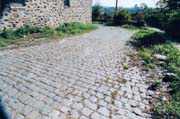When you walk down Holland Street in the Heights, you’re in a different century. Trudge over the cobblestone and now-weedy stretch that runs from Palisade Avenue to Paterson Plank Road and it feels like Dickens’ London or Proust’s Paris. It’s what the city had in mind when it laid down the street in the mid-19th century. But the steep roadway that once brought horse-drawn carriages into and out of Jersey City Heights has been slated for paving.
Now preservation groups and some Heights residents have started a campaign to save the street, while lawmakers are upset that a project that would open up traffic to an increasingly busy area and help clean up a long-time neighborhood eyesore may be scuttled.
“People who have lived there for 10 minutes are telling people what’s best,” said Council President Tom DeGise, a Heights resident.
John Gomez, president of the Jersey City Landmarks Conservancy, a nascent preservation group, sees things differently.
“It should be recognized as a historic site,” Gomez said.
The street was closed to vehicular traffic in the early-1980s, and reopened briefly from 1992 to 1995. It has long been an area of drug use, drinking and refrigerator dumping, according to Bill Gaughan, the Heights councilman. He had campaigned in the early ’90s to open the street, as well as the recently opened Mountain Road, to traffic. The city got bids this month for construction on the $200,000 paving project, which will be funded with state money. According to Department of Public Works Director Kevin Sluka, the state Department of Transportation would not fund the project with the cobblestones in place. The steep road could create hazards during winter, Sluka said. The current alternative is to pave over the stones and leave some exposed on the side for a one-way street that would go into the Heights.
The money also would go toward the rehabilitation of the chewed-up steps that lead down the cliffs onto Paterson Plank Road.
Sluka is trying to get residents, council members and preservationists together to discuss the matter. “Government doesn’t want to do stuff that the public doesn’t want to get done,” he said.
Using the grant
Resident groups like Margi Daly’s Heights Hope are pushing to preserve the road, and question the need for the paving.
“Not too many cars are using Mountain Road,” she said of the recently re-opened outlet, “Do we need another one?”
For the conservancy, which has suggested turning the street into a walkway and an extension of adjacent Riverview-Fisk Park, the matter is clear.
“Manhattan would kill to have a street like that,” said the conservancy’s John Gomez.
But, said DeGise, “If it was possible to make the roadway with the cobblestones, we would have done that. It’s not like we’re anti-cobblestone. We just can’t use the money that way.”
DeGise said that if the activist groups are not careful, the money might go to another neighborhood instead of theirs. “If they persist in this, we could use this money to rehabilitate other roads,” DeGise said. “We could go somewhere else.”
Traffic is a problem in the area. Only two points give access into and out of the Heights near Paterson Plank Road, and traffic backs up along Palisade Avenue and Congress Street. Opening up Holland Street may alleviate those traffic headaches and make the area safer, said DeGise and Gaughan. The street would likely run one-way from Paterson Plank Road into the Heights.
Independent bids for paving the road have been entertained by the city, Sluka said. If the council can’t make the decision to award the contract soon and the matter drags on, the money could go to other roads, he said.
The conservancy hails the street as “the jewel of all the remaining cobbled streets in Jersey City,” according to a written release. The group is seeking the immediate protection of the site, official landmark designation from the state and national levels, “viable economic and adaptive reuses” and promotion of the site as a tourist destination.
Holland Street is one of only several remaining cobblestone stretches in the city, according to the conservancy. They have also cited: Audrey Zapp Drive in Liberty State Park, Provost and Morgan streets in the Warehouse District, Manning Avenue in Lafayette, and 17th Street west of Marin Boulevard.
The conservancy held a press conference on Saturday in an attempt to raise awareness for the street and other “Endangered Historic Sites” in Jersey City, including St. John’s Episcopal Church at 120 Summit Ave., Jackson Avenue Station at 395 Martin Luther King Drive, and the Margaret Hague Hospital at Clifton Place near the Jersey City Medical Center.
